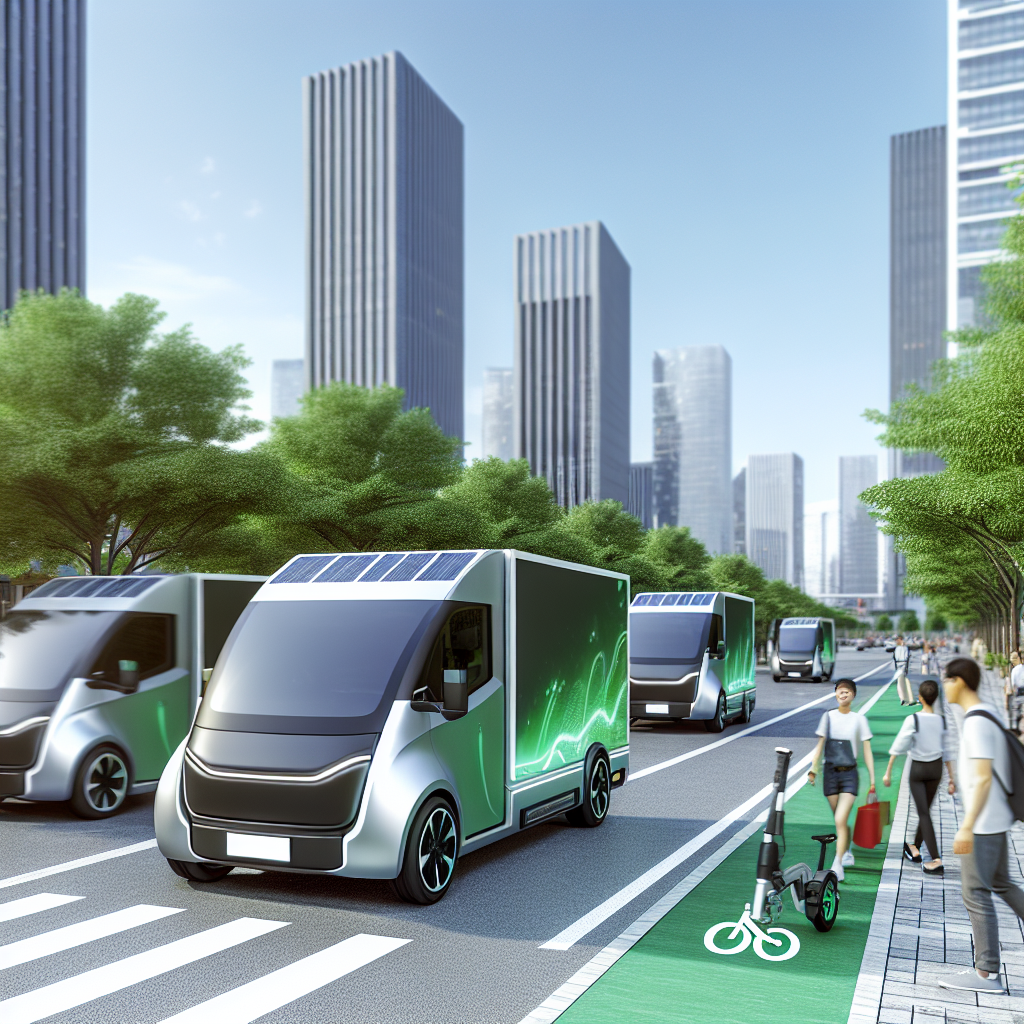In a pivotal move towards a sustainable future, Coke Canada Bottling has announced an ambitious $1.2 million investment dedicated to expanding its electric fleet. This bold step is not merely a financial infusion; it represents a significant commitment to environmental responsibility within the logistics sector.
The addition of ten new electric vehicles, including service vans and a yard tractor, brings their total fleet to 29, underscoring a growing trend towards greener operations in an industry historically reliant on fossil fuels. This investment highlights the essential balance between operational efficiency and environmental stewardship, setting a fresh standard for companies looking to reduce their carbon footprint.
As initiatives like this gain momentum, they raise crucial questions about the future of transportation and corporate responsibility. How will such investments reshape the logistics landscape, and could this signal a monumental shift in global industry practices?
Investment Details
Coke Canada Bottling’s recent $1.2 million investment represents a substantial step toward sustainability and reducing environmental impact by expanding its electric fleet. With this funding, the company will add ten new electric vehicles, which will include service vans and a specialized yard tractor.
The addition of service vans shows the company’s commitment to efficient logistics and delivery operations. These vans are essential for daily tasks such as transporting packages and servicing equipment. By switching to electric models, Coke Canada Bottling not only improves operational efficiency but also significantly cuts down on greenhouse gas emissions from its transport activities.
Moreover, the inclusion of a yard tractor is noteworthy. Yard tractors are crucial for warehouse and distribution center operations, as they move trailers and containers within the yard. Transitioning to electric yard tractors is expected to improve operational performance, reduce noise pollution, and enhance air quality around facilities.
This investment also fits into Coke Canada Bottling’s broader strategy to develop its electric fleet, which now totals 29 vehicles after this expansion. The $1.2 million investment meets immediate operational needs while also demonstrating the company’s dedication to long-term sustainable business practices. As such, this strategic investment serves as an example for other companies in the industry, showing that sustainable practices can coexist with growth and efficiency.
Sustainability Impact of Coke Canada Bottling’s Electric Fleet Expansion
Coke Canada Bottling is enhancing sustainability in the logistics industry through its expansion of an electric fleet. The company’s recent investment of $1.2 million to add ten new electric vehicles, including service vans and yard tractors, strengthens its commitment to reducing its carbon footprint. As the first Canadian food and beverage manufacturer to integrate electric Class 8 trucks, Coke Canada Bottling sets a precedent, showcasing the viability of electric logistics in a sector traditionally reliant on fossil fuels.
The introduction of electric trucks supports Coke’s goal of reducing carbon emissions by 46.2% by 2030 within the framework of its “Toward a Better Future Together” action plan. This is a significant carbon emissions reduction strategy aimed at enhancing environmental practices in logistics. Operational efficiency is enhanced as these vehicles can effectively handle daily ranges, addressing logistical needs without compromising sustainability. Furthermore, the infrastructure supporting this fleet—such as the installation of DC chargers—minimizes downtime and promotes efficient green logistics operations.
Coke’s efforts not only contribute to environmental relief through reduced greenhouse gases but also catalyze industry-wide shifts towards adopting sustainable practices. By leading in the implementation of electric vehicles, the company illustrates how eco-friendly operations can benefit both the environment and business strategies. Through economic incentives and visible leadership, Coke Canada Bottling demonstrates a pathway forward for other companies, facilitating a greener logistics landscape and enhancing overall air quality by reducing harmful emissions.
In conclusion, the adoption of electric vehicles is a cornerstone of Coke Canada Bottling’s sustainability impact. This initiative aligns with broader trends in the logistics industry, responding to global calls for reduced carbon emissions and environmentally responsible practices. As logistics operations increasingly adopt electric fleets and green logistics strategies, we move closer to a sustainable future that emphasizes operational efficiency alongside ecological stewardship.
| Criteria | Electric Vehicles | Diesel Vehicles |
|---|---|---|
| Emissions | Zero tailpipe emissions | High CO2 and air pollutant emissions |
| Operating Costs | Lower fuel and electricity costs | Higher fuel prices and maintenance |
| Maintenance Costs | Typically lower due to fewer moving parts | Higher due to engine complexity |
User Adoption Rates for Electric Vehicles in the Logistics Sector
User adoption of electric vehicles (EVs) in the logistics sector has gained significant momentum in recent years, particularly in 2023. The global landscape shows that electric vans have surged, accounting for over 60% of sales in the segment, with around 250,000 units sold. This trend is substantially fueled by the growing demand for EVs in last-mile delivery services, reflecting a shift in operational paradigms towards more sustainable practices.
In the United States, projections indicate that by 2030, electric trucks and heavy-duty vehicles will make up 25% of logistics fleets. This shift is backed by supportive governmental policies and decreasing costs of electric vehicles. Major logistics operators such as UPS and FedEx are gradually increasing their adoption rates; however, they encounter challenges such as battery shortages and the limited availability of EV models. Currently, both companies have deployed approximately 1,000 electric vans, indicating an exploratory phase rather than a full transition to electric solutions.
European intakes are somewhat lagging, with electric vehicles constituting only 2.1% of Germany’s commercial truck fleet as of early 2024. In response, Germany has initiated a nationwide fast-charging project aimed at enhancing infrastructure to facilitate electric vehicle operations, targeting at least 350 fast-charging sites along federal highways to aid decarbonization efforts.
The overall market for electric logistics vehicles has shown impressive growth, with a valuation of USD 23.5 billion expected to climb to USD 75.4 billion by 2033, reflecting a robust compound annual growth rate (CAGR) of 14.2%. This expansion is primarily driven by advancements in battery technology and greater efficiencies in logistics operations.
When comparing electric and diesel vehicles, electric logistic vehicles not only provide substantial environmental benefits but present lower total ownership costs. The maintenance costs of electric vehicles can be up to 40% lower than those of diesel vehicles, making them an economically favorable option for logistics companies. Additionally, the integration of advanced digital technologies for fleet management is leading to a significant reduction in downtime, further enhancing the appeal of electric vehicles in logistics operations.
In conclusion, the logistics sector’s transition towards electric vehicles is picking up pace, characterized by increasing sales, supportive policies, and advancements in technology. These trends depict a broader shift towards sustainability, presenting a promising future for electric logistics.
User Adoption Rates for Electric Vehicles in the Logistics and Beverage Industries
The adoption of electric vehicles (EVs) in the logistics sector has been gaining significant traction, while the beverage industry is starting to explore its potential. Here is a summary based on recent data for 2023:
Logistics Industry:
- The global stock of electric commercial vehicles, including trucks and vans, surpassed 2 million units in 2023, reflecting a marked increase in adoption.
- The U.S. electric commercial vehicle market alone was valued at approximately $13.88 billion, projected to more than quadruple to $55.92 billion by 2029, at a CAGR of 26.41% source.
- Major logistics companies such as UPS and FedEx are implementing electric vans, with both companies having approximately 1,000 electric vans operational despite facing challenges like battery shortages and limited availability of models source.
- Amazon has added more than 10,000 electric cargo vans sourced from Rivian as part of its approach to green logistics source.
Beverage Industry:
- While specific statistics focusing exclusively on the beverage sector’s electric vehicle adoption are scarce, the broader electrification trend indicates that beverage companies, including Coca-Cola and PepsiCo, are beginning to implement EVs into their logistics operations as part of their sustainability efforts.
- The industry is encountering similar challenges to the logistics sector, such as high initial costs, limited vehicle availability, and insufficient charging infrastructure, which affect the pace of EV adoption in beverage distribution.
- The transition among beverage companies aligns with the growing consumer preference for companies demonstrating environmental responsibility in their operations.
In conclusion, the logistics sector is experiencing more advanced stages of electric vehicle adoption compared to the beverage industry, which has yet to fully leverage this shift. However, both sectors showcase a commitment to sustainability through the gradual move towards electric vehicles, mirroring broader trends in environmental responsibility in the business world.

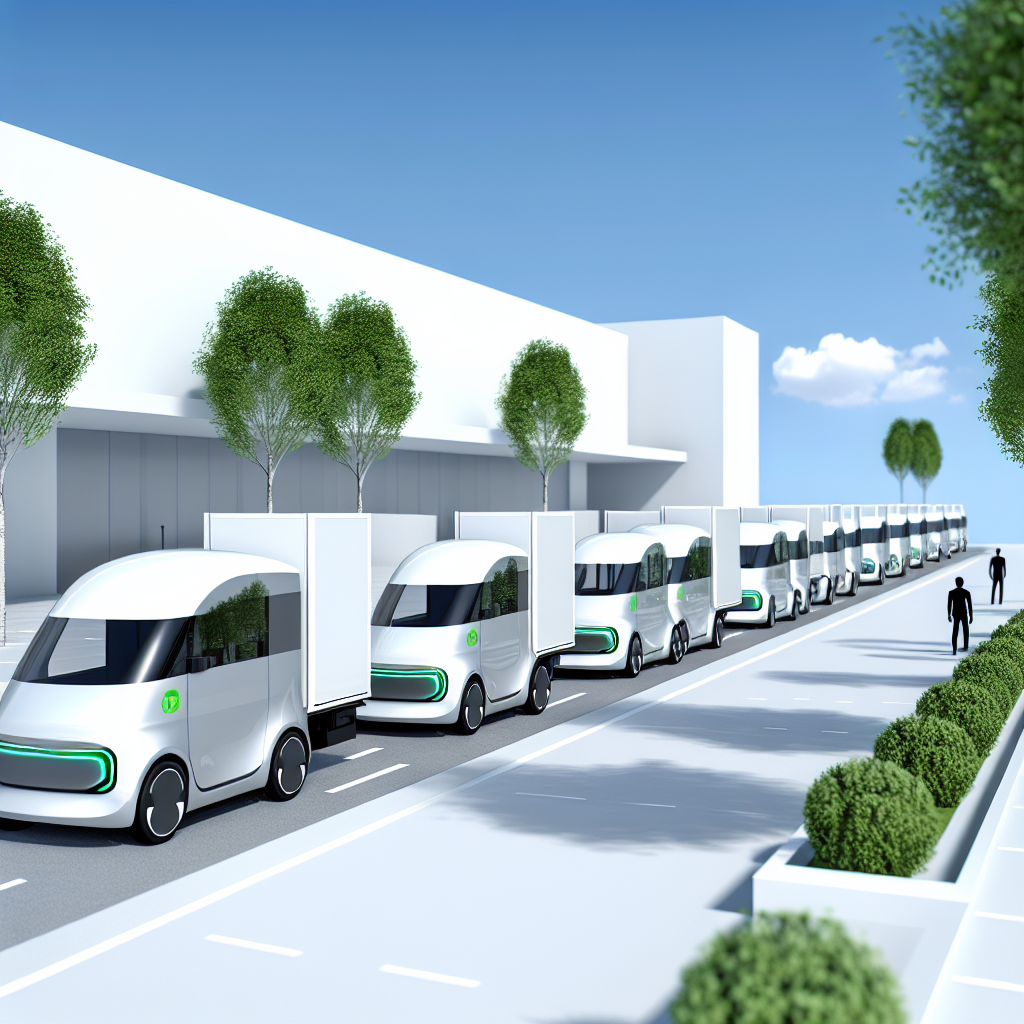
Conclusion
Coke Canada Bottling’s investment of $1.2 million to expand its electric fleet underscores a transformative step towards sustainability in the logistics sector. By increasing its electric fleet to a total of 29 vehicles, including essential service vans and yard tractors, the company showcases a strong commitment to significantly reducing its carbon emissions and promoting eco-friendly practices within its operations. This strategic move not only enhances operational efficiency but also demonstrates how environmental responsibility can harmoniously coexist with business growth.
The ripple effects of this investment resonate throughout the logistics industry, highlighting the urgent need for a shift towards electric vehicles (EVs) as part of broader sustainability efforts. With projections indicating that the transition to electric fleets might reduce greenhouse gas emissions in transportation by up to 70% by the year 2050, Coke Canada Bottling emerges as a trailblazer in encouraging other companies to follow suit. Such initiatives contribute not only to corporate accountability but also to the larger movement towards a cleaner, more sustainable future in logistics.
In conclusion, Coke Canada Bottling’s proactive steps in embracing electric vehicles represent a significant advancement in sustainable operational practices, responding to increasing consumer environmental expectations and regulatory pressures. As more businesses recognize the importance of such investments, we can anticipate a marked shift in industry standards towards greener initiatives, ultimately benefiting both our planet and future generations.
Share Your Thoughts
As we reflect on Coke Canada Bottling’s substantial investment in expanding its electric fleet, we invite you to join the conversation. What are your thoughts on electric vehicle investments in logistics? Do you see it as a viable path toward sustainability for companies? We would love to hear about your experiences or insights on this evolving landscape.
Have you implemented electric vehicles in your logistics operations? Share your stories about the benefits, challenges, and lessons learned. Together, we can learn from each other’s journeys and foster a community committed to pushing for greener logistics solutions.
Additionally, consider following Coke Canada Bottling’s initiatives as they continue to pave the way for sustainable logistics solutions. Stay informed about their progress and the broader impact on the industry by keeping an eye on their updates and commitments to reducing carbon emissions. Together, we can embrace sustainability and advocate for a cleaner future in logistics!
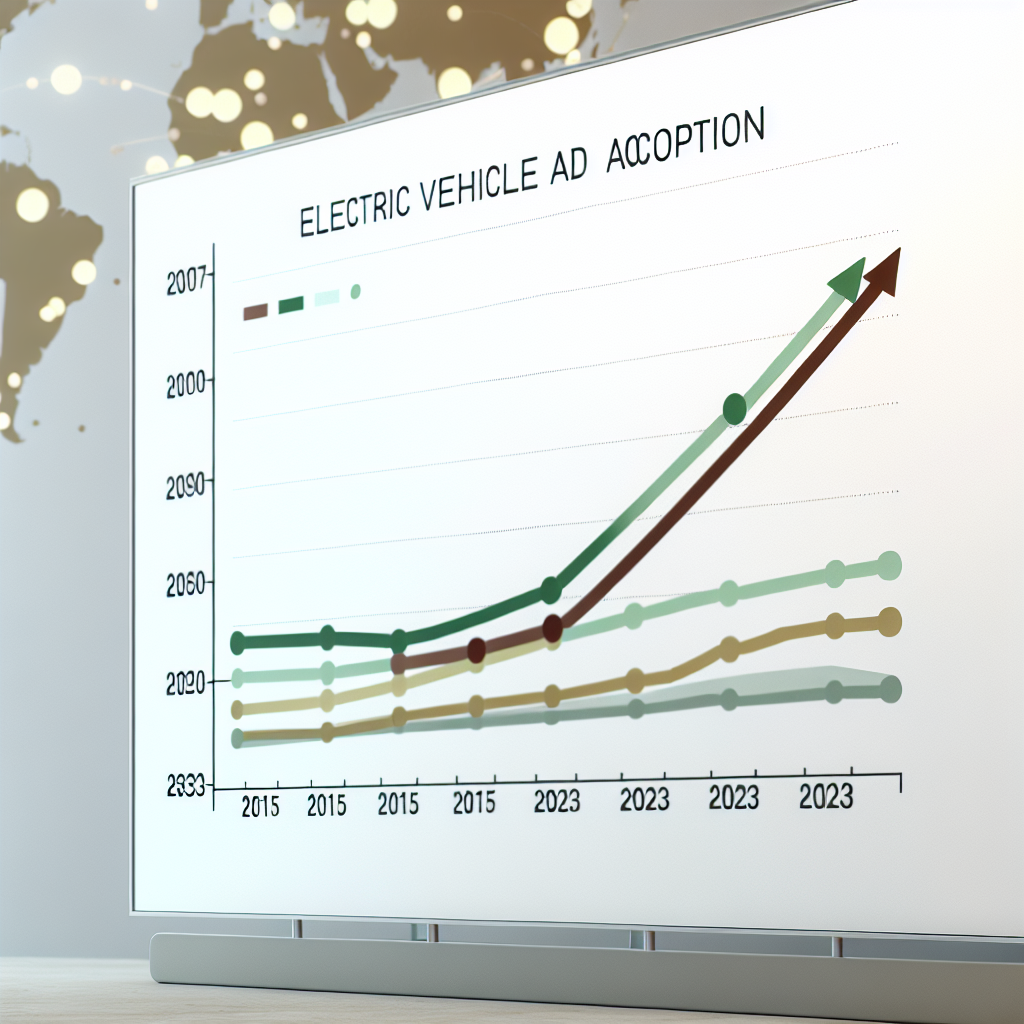
A visual representation of the growth of electric vehicle adoption in the logistics industry, showing rising sales statistics from 2015 to 2023, with regional variations in color.
Financial Context of Electric Vehicle Investments in the Beverage Industry
Coke Canada Bottling’s initiatives illustrate a significant trend in the beverage industry towards integrating electric vehicles (EVs) into logistics. The company recently acquired six Volvo VNR Electric trucks, marking the first time a Canadian food and beverage manufacturer has utilized electric Class 8 trucks. This move is part of Coke Canada Bottling’s strategy to reduce carbon emissions from its operations by 46.2% by 2030, aligning with its “Toward a Better Future Together” sustainability plan. These electric trucks can cover up to 440 kilometers per charge, making them suitable for daily deliveries within the Greater Montreal area.
To enhance the viability of this electric fleet, Coke Canada Bottling installed DC chargers at its Montreal distribution center, showcasing the critical role that supporting infrastructure plays in the success of electric vehicle logistics.
Moreover, the growing consumer preference for environmentally responsible businesses is driving the beverage industry towards adopting sustainable practices. Consumers are increasingly favoring companies that demonstrate a commitment to environmental responsibility, influencing operational decisions regarding logistics and fleet management. However, the industry’s transition to electric vehicles is not without challenges. Recent market disruptions, such as Honda Canada’s postponement of a multibillion-dollar investment in EV technology, highlight the complexities businesses face when navigating the evolving landscape of electric vehicle infrastructure.
Overall, Coke Canada Bottling’s commitment to electric vehicles represents a progressive shift in the beverage industry, demonstrating how the sector is adapting to regulatory pressures and market demands for sustainability while overcoming potential obstacles in implementation.
Quote from Coke Canada Bottling Spokesperson
Todd Parsons, CEO of Coca-Cola Canada Bottling Limited, stated:
“Our ‘Red Fleet’ is iconic on the roads of our country and, as we strive to become the leading beverage partner in Canada, we’re extremely proud to partner with Volvo Trucks to be the first Canadian food and beverage manufacturer to use battery-electric trucks. The electrification of our fleet is a key component of our plan to reduce direct carbon emissions. We know we continue to have work to do and look forward to working together with Volvo Trucks on opportunities to expand this pilot in years to come where it makes sense. We recognize we have a responsibility to effectively manage our environmental impact and we are working to decrease the emissions from our fleet.”
This quote highlights the commitment to sustainability as Coke Canada Bottling embarks on its electric fleet expansion as part of its broader environmental initiatives.
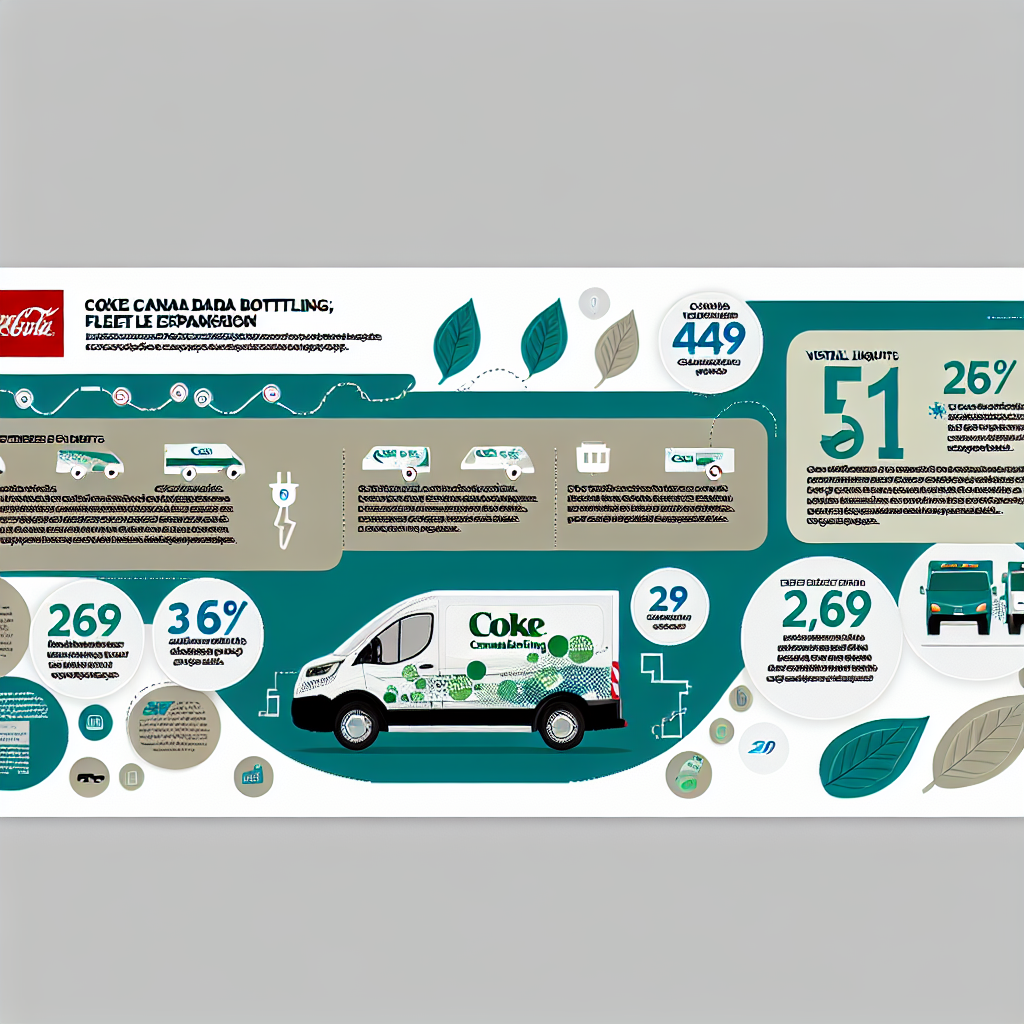
A simple infographic showcasing the details of Coke Canada Bottling’s electric fleet expansion, including the $1.2 million investment, 10 new vehicles added, and a total fleet size of 29 vehicles.
Sustainability Benefits of Transitioning to Electric Vehicles
Coke Canada Bottling’s expansion of its electric fleet not only represents a forward-thinking investment in modern logistics but also signifies a substantial commitment to sustainability and environmental responsibility. The transition from traditional gasoline and diesel vehicles to electric vehicles (EVs) offers numerous environmentally friendly benefits.
One of the most compelling advantages is the significant reduction in greenhouse gas emissions. By integrating ten new electric vehicles into their operations, Coke Canada Bottling aims to decrease its carbon emissions, aligning with its goal of a 46.2% reduction by 2030 as part of its “Toward a Better Future Together” action plan. Electric vehicles produce zero tailpipe emissions, which is a major stride towards combatting climate change and enhancing air quality in urban and rural environments alike.
The positive impact of this shift extends beyond immediate emissions reductions. By adopting electric vehicles, Coke Canada Bottling is contributing to better air quality. The burning of fossil fuels in traditional vehicles releases a variety of pollutants that contribute to poor air quality and respiratory illnesses. On the contrary, electric vehicles operate cleaner, reducing not only carbon emissions but also other harmful pollutants such as nitrogen oxides and particulate matter.
Moreover, the broader implications of Coke Canada Bottling’s shift to electric vehicles echo throughout the logistics industry. As a pioneer in this space, the company sets a benchmark for other organizations to follow, showcasing how sustainability and operational efficiency can go hand in hand. This electric fleet expansion serves as a vital example of how investing in green technologies can yield functional benefits while promoting ecological stewardship.
In conclusion, the environmental benefits of transitioning to electric vehicles are manifold. By reducing greenhouse gas emissions, improving air quality, and establishing sustainable practices within the logistics sector, Coke Canada Bottling not only enhances its operational footprint but also encourages a larger industry trend towards sustainability. This initiative demonstrates that corporate responsibility and ecological sustainability can successfully intersect, paving the way for a greener future in logistics and transportation.
| Cost Factor | Electric Fleet | Traditional Fleet |
|---|---|---|
| Initial Purchase Cost | Higher upfront costs due to technology | Generally lower upfront costs |
| Fuel/Energy Costs | Lower costs with renewable sources | Fluctuating fuel prices |
| Maintenance Costs | Typically lower due to fewer moving parts | Higher due to engine complexity |
| Depreciation | Slower depreciation rates | Faster depreciation rates |
| Infrastructure Investment | Needs charging stations | No additional infrastructure needed |
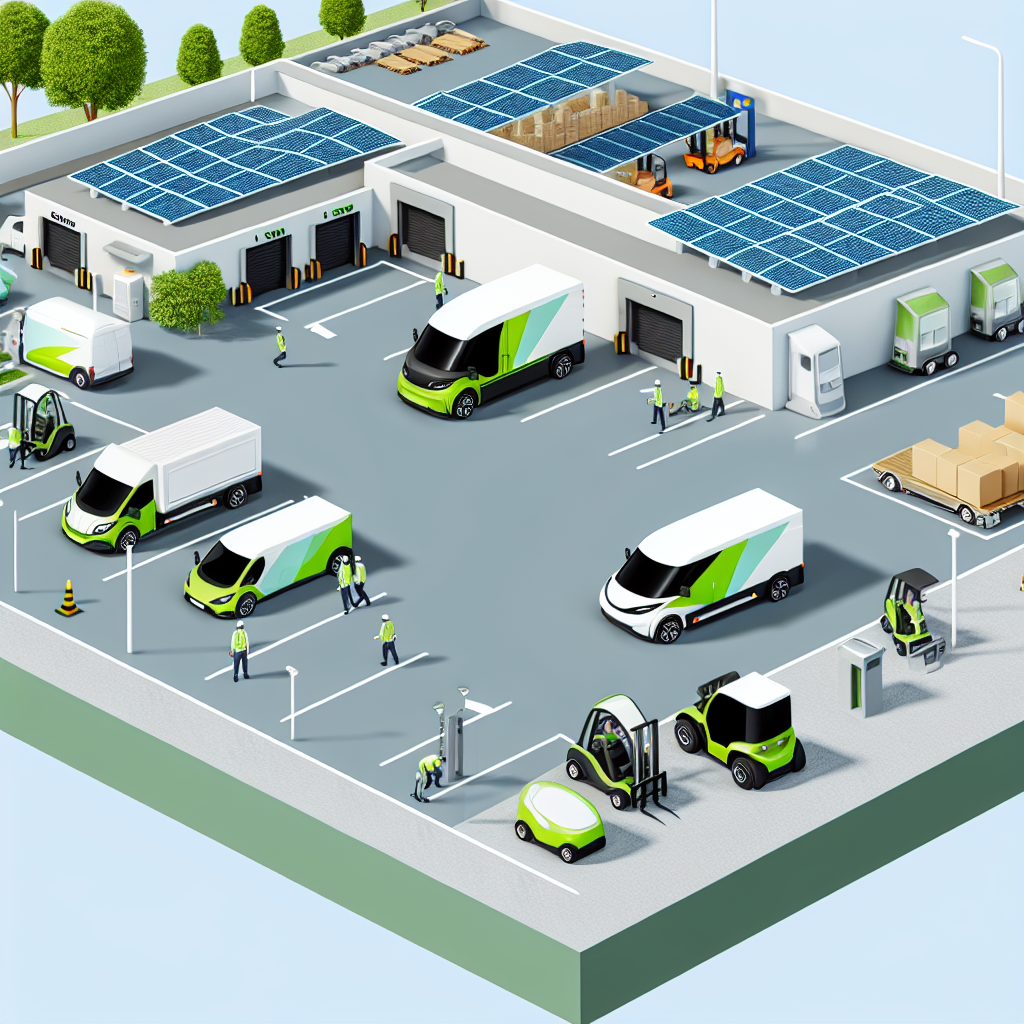
A simple image depicting various types of electric vehicles such as service vans, electric trucks, and yard tractors in a clean urban environment. The vehicles are shown in operation, highlighting their eco-friendly design and integration into logistics operations.
